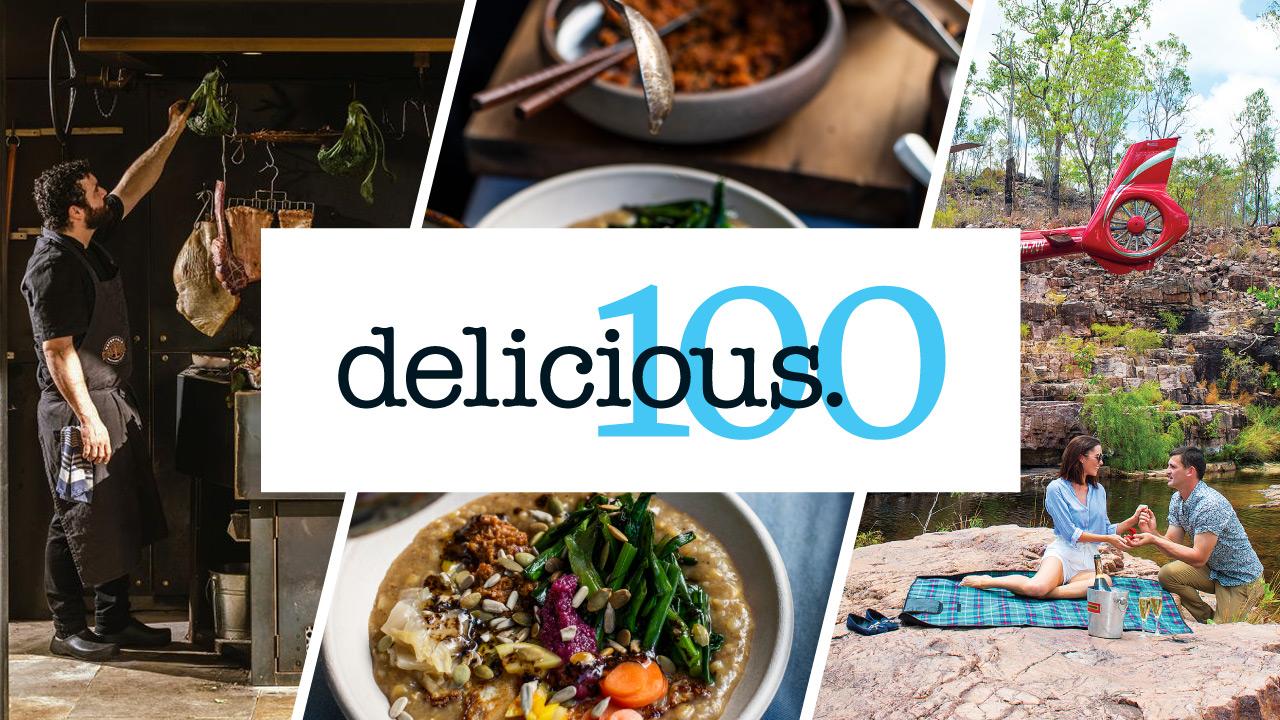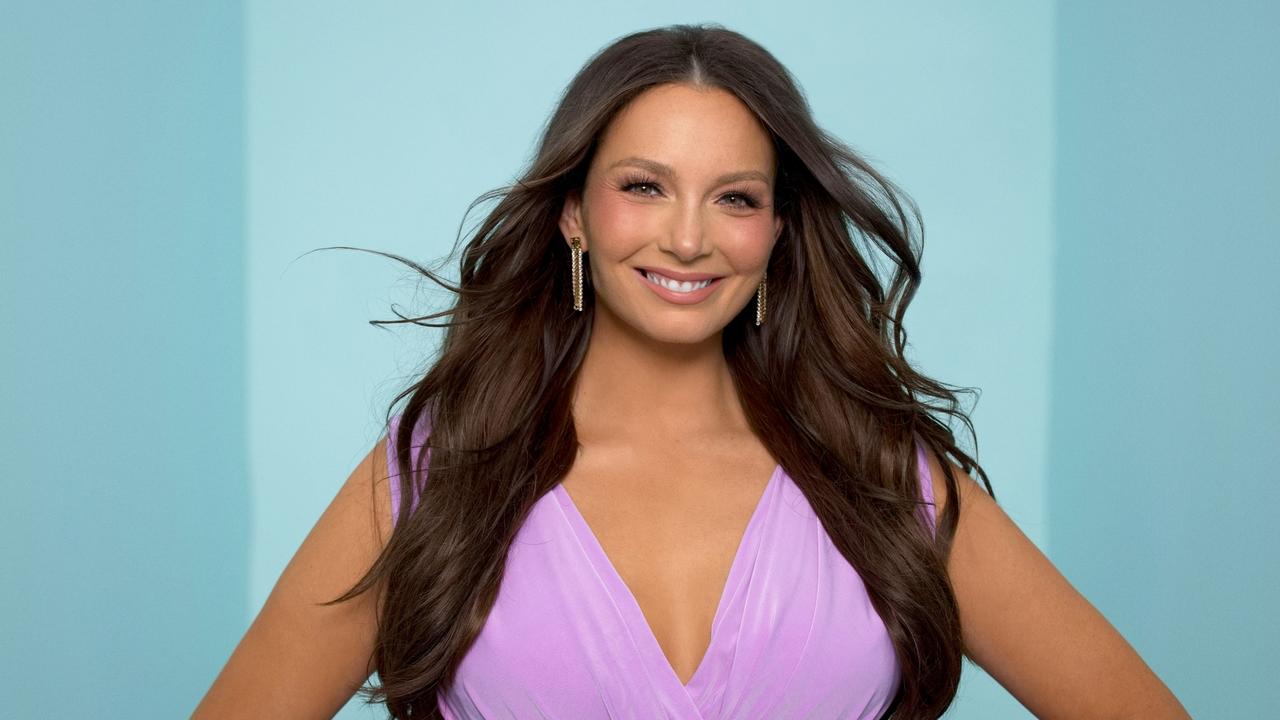Blind surfer Matt Formston has his sights set on a new daring challenge
After surfing a 50-foot wave, Paralympian and para surfing world champion Matt Formston has settled on a new challenge to embark on, which will take him well below the swell.
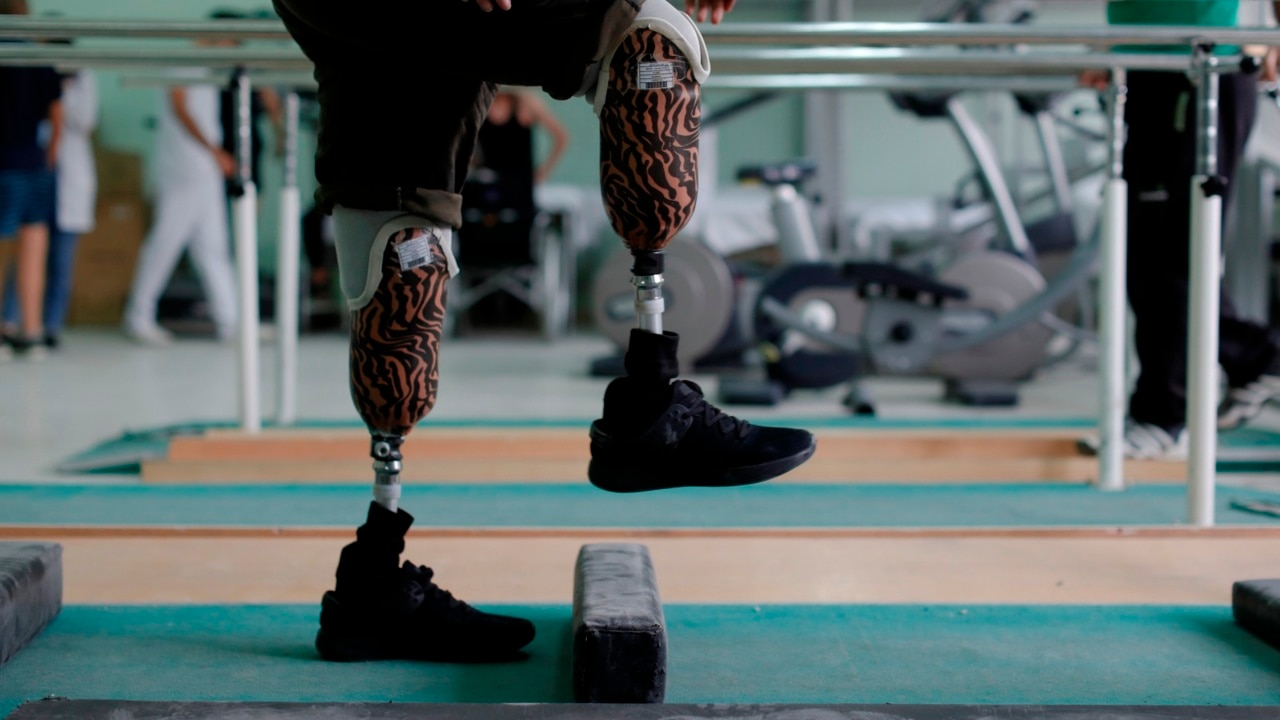
Sydney Weekend
Don't miss out on the headlines from Sydney Weekend. Followed categories will be added to My News.
Blind surfer Matt Formston has dominated the biggest waves in the world – and he’s got the Guinness World Record to prove it. With only three per cent vision, he couldn’t see the 51 foot wave he rode at 65km/h at Portugal’s infamous NazareÌÌ break last year.
That’s pummelling down a near 16m drop – or a five-storey building – blurring the line of the horizon. That may be a good thing, he reasons – you can’t fear what you can’t see – but you can feel the power of it.
There’s not much Formston won’t do, except say the c-word, that is. “Can’t” isn’t in his vocabulary.

That’s why he’s already set his next challenge – because what goes up, must come down.
“I want to go deeper,” the father of three says.
“So to surf Nazare I trained to hold my breath and my longest breath-hold underwater was nearly six minutes – 5:48. So because I’ve already got that capability, do I build on that and swim deep? So I’m thinking about doing a para freediving world record and swimming very deep into the dark depths of the ocean – on one breath.
“I’m considering doing another film and another journey of setting a Guinness World Record – this time for freediving and swimming as deep as possible.
“People often say, ‘Why would you do that?’ – and it’s like … why would I not do that?”
Doubt and dismissal is something Formston has faced his whole life. At the age of five, he was diagnosed with macular dystrophy, a rare eye condition that left him two life-changing things – three per cent vision, and a desire to do what everyone else says he can’t.
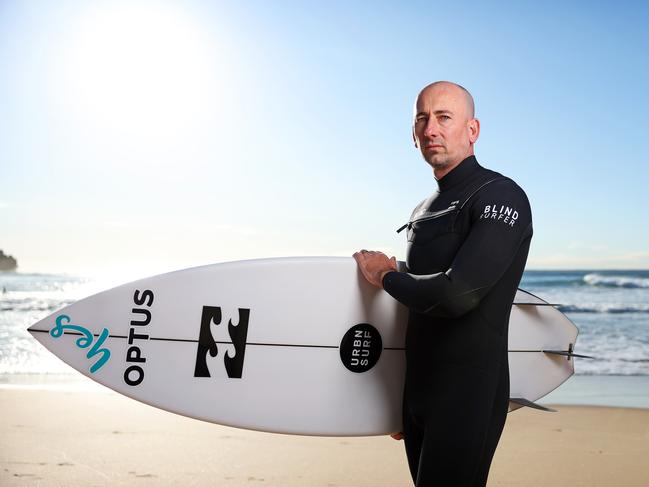
When he was 10 his dad bought him a motorboat, and he would fang around Narrabeen Lake, not far from his family home.
Always at peace in the ocean – it’s where he feels totally free – by 11 he’d transitioned from his bodyboard to standing up on a surfboard – and because of a bully, no less.
“I tried to surf but it was hard – and then I basically got bullied by a girl,” he says. “There was this girl that I met at a bonfire when we were camping at Seal Rocks when I was 11, and I was having a chat to her by the bonfire.
“The next morning I was out surfing on my bodyboard and my mate said, ‘She’s over there.’
“So I paddled over to her with my little Esky lid and said ‘hi’ – and she didn’t respond. I went back to my mates and said it’s not her – but they said for sure it was, so I paddled back over and obviously can only see little blobs and blurs – and I said ‘hi’ again, and she ignored me.
“Then the next night we were at the bonfire again and I ended up talking to her and said, ‘Was that you?’
“She said yes, and I asked her why she ignored me – she said because ‘you’re on a bodyboard – don’t ever f--king talk to me on an Esky lid again.’
“So I wasn’t being discriminated against because of my disability – it was because of my surf craft disability.
“From that point on, I went home and never rode a bodyboard again. I started standing up.
“So I can thank that young lady, because I’m one of the world’s most accomplished surfers because I made that choice – because I wanted to be cool for a chick.”
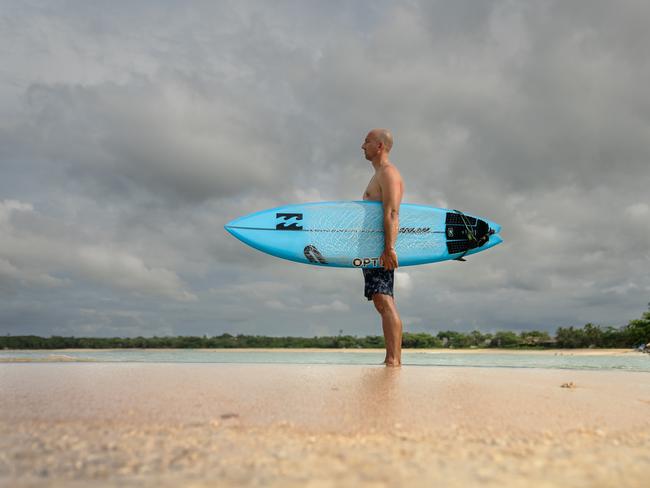
Formston is now a four-time world champion para surfer, a long journey that is brought to life in a new feature length documentary The Blind Sea, which will come to cinemas around the country next week.
As well as a world champion surfer, he is a Paralympic cyclist (2016 Rio Games). The Central Coast local is as determined as he is capable – but he didn’t always think so.
“We all do things for certain reasons, and our journeys go in certain ways. My life has been a journey … and because of some of those things, I just wanted to prove (something) to the world,” the Wamberal 46-year-old says.
“Growing up, I used to get into lots of bar fights and things, and that was me trying to get back at bullies and try and prove that perhaps I could still bash sighted people.
“But then I realised how toxic that was.
“And I was just trying to do things for other people to prove to people that I didn’t have a disability. Once I realised, actually, that’s part of my identity, that’s who I am – and I own that – then all of a sudden, I found my wife, I became a world champion cyclist, and everything I do in my life has been fantastic, because I’ve just owned who I am.
“I do things that I want to do rather than doing things to prove other people wrong, which has been a big mind shift for me.”
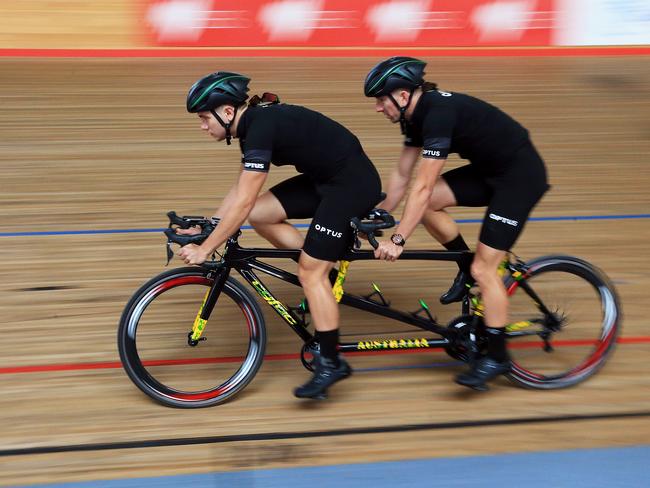
That shift was spurred on by his parents – who first instilled his hate for the dreaded
c-word – and the lowest point of his life, which came in his 16th year.
“The darkest period of my life was when one of my friends took his life,” he says. “It changes you. But it also changed my parents.
“They pushed me really hard until it happened, and then they backed off a bit because of that. And then I ended up starting to take substances and party and got into pub fighting and violence and didn’t have a lot of healthy relationships because of negative behaviours.
“So that was probably the hardest period of my life. And to be honest, I’m very lucky that I didn’t end up in jail or dead. I’m very lucky.
“There’s no skill involved, it’s just pure life.
“But to this day, my biggest achievement is getting out of that. Because once I got out of those behaviours, and realised that I’m better than that, that’s when it all clicked.
“So I stopped partying so hard, stopped taking substances, stopped having to escalate violence to resolve conflict and once I got out of all of those bad behaviours – which was around my late 30s – within a year, I was riding for Australia, and I’d met my wife.”
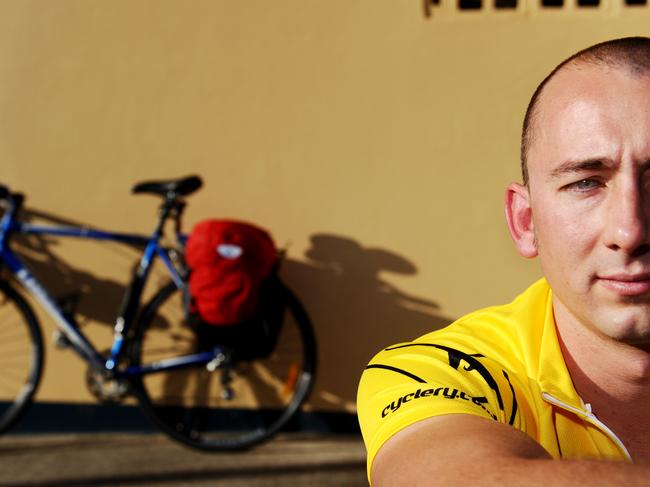
That shift was born from a change in perspective – one that pushed him to the brink at Nazare and one that will see him dive deeper than anyone else before him. “People think of it as ‘Your parents tell you that you can do anything’ – and that’s that fluffy, wind-blowing thing that you can do anything,” he says.
“That’s not how my parents were. My parents brought me up to say, if you don’t want to do something, you need to say why you’re choosing not to do it.
“So we weren’t allowed to use the word ‘can’t’. So rather than having this thing where people just go, ‘Oh, you can do anything’ – that’s great – but then when you actually get to a point where it’s a bit gritty, how do you deal with that?
“Whereas you can look at it from the other perspective – instead of looking at the ‘you can do anything’ perspective you look at the thing and say, ‘you’re not allowed to use the word can’t’ – it’s just an excuse, it’s a dead end.
“So even from a young age, I had to articulate, ‘Right now, I don’t have the capability to do x, y, and z’ and ‘I need to do this, this and this, or have these resources, to be able to do that.’ Or ‘I don’t want to do that right now, because it’s too hard’, or ‘I don’t want to do it.’
“But as soon as you say ‘I can’t do that’, that’s the end of the road, and you’re not actually giving your brain the opportunity to find the next step forward.”
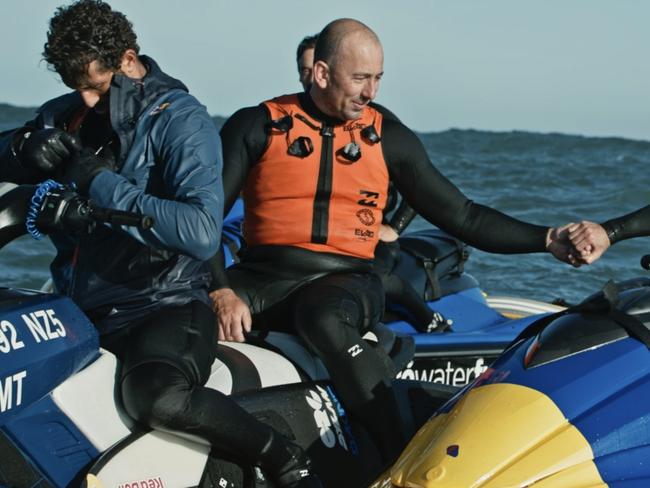
So what’s it like, to ride the biggest wave in the world?
“It’s fun,” he laughs. “Like, you know, you’re on a roller coaster and you’re going, ‘This is heaps fun.’ So I have different mindsets and different people do different things but, for me, it’s just having fun – you’re going so fast.
“Because a wave that size, you’re doing 65km/h. The board’s just cutting through the water, and just … fun. It’s just joy. And it’s an awesome feeling because everyone wants to know how big the waves were that I surfed in Nazare. And as a surfer, it’s a real Aussie thing where you make it smaller.
“Like – ‘Oh, I don’t know how big it was.’
“But the process for Guinness is so regimented and the amount of data and evidence you have to provide them, there’s no question around what the size was.”
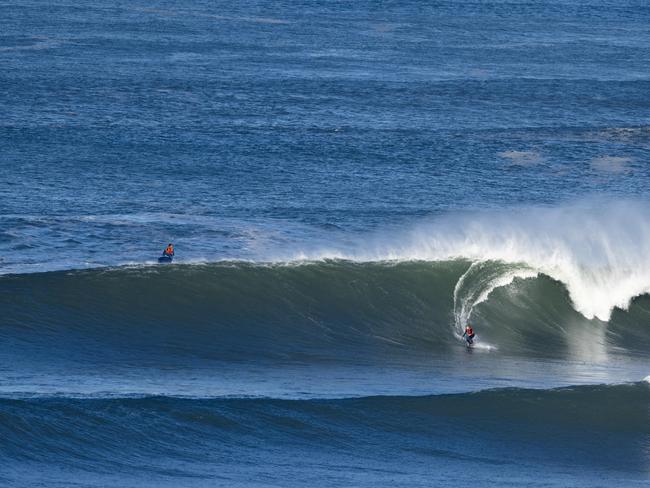
It is “an Aussie thing” to talk things down, he admits – but it shouldn’t be.
“There was an article that said, ‘Matt is one of the greatest blind surfers in the world’,” he says. “And I was not really comfortable with that.
“Because if you’re gonna say anything like that, say it properly. I am the greatest of all time. I’ve won the most world titles, a lot more of everything than anyone else and I’ve got a Guinness World Record. So it’s like, there’s other people that could say they’re one of the best – but I am the best.
“But I’m not gonna say that, because I’m an Australian.”
The fear doesn’t normally get to him. He trained six days a week to mitigate it, and understanding the difference between perceived risk and real risk is key to survival.
“Normally, I don’t have the fear thing that other people have, because I just break it down into what’s the real risk, what’s perceived risk, and what do I need to do to manage the risk?” he explains. “And I’m very analytical in that I don’t let the emotion come into it.
“But obviously, my life experience helps me do that too. Because I’ve done the most crazy stuff humans do. I’ve ridden down hills on a pushbike over 100km/h and just stuff that other people don’t do, so my brain knows how to break that stuff down.
“But Nazare, in particular, was different because I didn’t want to go to the media before we went there, and then because we were making a movie, obviously the director wanted to get media – and the narrative from the media was … the blind guy’s gonna die.
“Six weeks after we were there, someone died surfing a 30 foot wave – and we’re surfing 50 foot waves. It’s a war zone and people do die. It’s a very serious place and no blind person had ever surfed that wave before.”
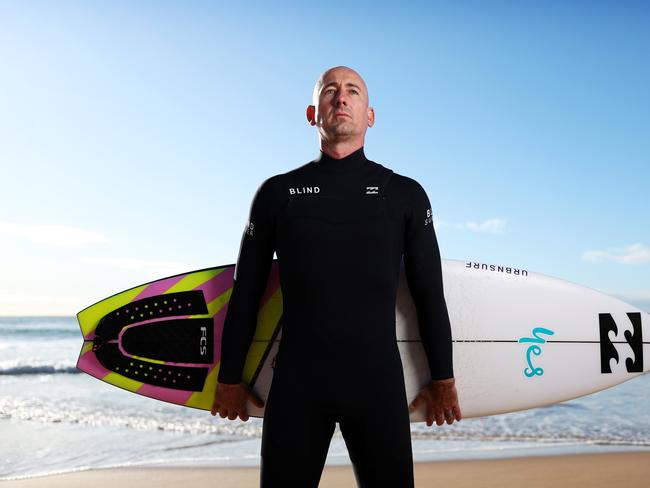
Nazare was the first time he let it creep in. Pushed over the edge by his son pleading with him not to die, he was scared. For a second, anyway. “Because I’d heard so much in the media, and then my son saying to me, ‘Don’t die’ – that stuff is in your head,” he continues.
“So I’ll never forget, I was lying at the back, holding on to my tie rope with the jet ski, lying in the water, looking up at the sky … and there was this moment in my head of like, ‘Do I know better than them? Am I going to come out of this?’ When I was younger and a bit more reckless, I would have gone, ‘Well, who cares, I’m just gonna go’ – but now with three children, there has to be more analytical risk analysis.
“So there was a bit of fear.
“But other people talk about the fear of pain, and the fear of trauma – I don’t. The fear for me is that my children would lose their dad and my wife would lose her husband. The rest of it doesn’t bother me. If I break bones, I don’t care.”
He says perceived risk in the ocean is getting attacked by a shark. You’ve got more chance of winning the Lotto, he laughs. And drink drivers have a higher probability of dying than he does as a big wave surfer. Calculated risk – that he can manage.
“I trained to a crazy level, my team are the best surfers in the world – we’re taking very calculated risks, we’re not taking silly risks,” he says. “We’re actually minimising the real risk to the point where it’s almost not there. And bad things happen but we train for those things, so that’s what I love. I love the professionalism of it all. As a person growing up with a disability, you’re not always included. You have to include yourself, I suppose, and insert yourself – and that’s sort of who I am. I’m a doer.”
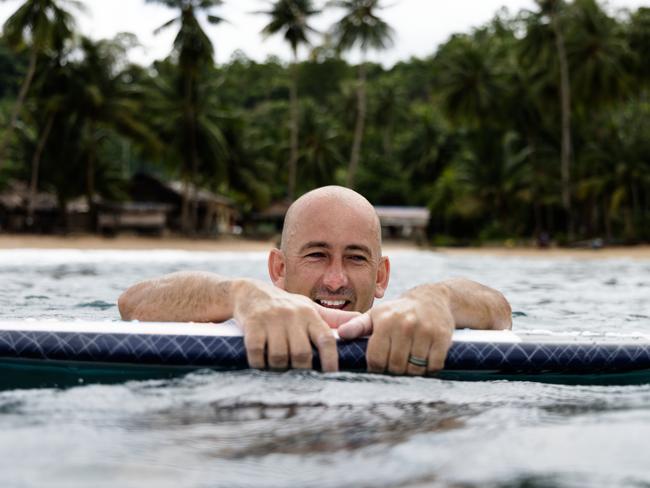
He first met his wife Rebecca the “old fashioned way” on Manly Beach. She was a British tourist two weeks into her travels, and has never left. Their kids – Max, 10, Elsie, 8, and Jake, 6 – are doers too. And they’re also banned from the c-word.
“My eldest son has played rep football, he won his speaking competition in his school, he was dux in his year in multiple years for education,” Formston says. “And he surfs really well … but then he doesn’t like surfing most of the time. He’s scared of surfing. He’s scared of waves – because I took him out in too big waves when he was young, so I’ve made some definite parenting mistakes.
“But the one thing I’ve definitely taken on is my parents’ thing around not using the word ‘can’t’. I’d much prefer them use the ‘c’ word with a ‘u’ in it rather than the ‘c’ word with an ‘a’ in it – because CAN’T is more debilitating.
“So before my kids go to sleep every night, they say, ‘I am brave, I’m inquisitive. I am grateful. I am kind, I am happy’ – and then they say their name. And then they go to sleep for 12 hours. So while they are asleep they have those values and behaviours in their head … once you have those behavioural traits, then you can learn anything.”
There’s currently a petition out to include surfing in LA’s 2028 Paralympics – if it is, Formston is in, and that will be his focus from 2026. Until then, it’s a deep dive into … deep diving. “In the next few years, I think I’m going to focus on this freediving thing and knock that out of the park,” he says.
“Surfing will always be there. Surfing is my love. It has been my life since I was five years old. It’s where I have my freedom, as a blind person. I walk anywhere – I get out of the car and there’s poles and puddles and gutters and things trying to hurt me everywhere. Whereas in the surf, I’m just free. It’s my comfy place.”
He won’t be limited by a goal yet. But the first step will be finding the best people in the world to give him the best information for him to start his training.

“And then I’ll do the best training,” he says.
“I will train as hard as I can with the best information I have. And then I’ll keep making sure that they’re the right people to work with through the process. And then I’ll set a really big goal – I don’t have a goal right now because I don’t want to set myself short.
“A lot of people when they set goals, they actually cut themselves short. So with Nazare I didn’t have a goal, I just wanted to surf the biggest wave possible.
“I think if we had a goal – originally the guys were talking about 30 feet, but then we ended up surfing over 50 feet.
“So if I set a goal of 50m under water now for freediving, maybe I can get further than that. So I don’t want to set a number.
“I just want to build as much capacity as possible – and then push the shit out of it and set a record that future people with disabilities can work towards.”
His unmatchable determination has come from different drivers at different parts of his life – right now, it’s one of “being super inquisitive”. “Like, what is possible?” he asks. “Because people say – that’s not possible – no way a person with three per cent vision can surf a 50 foot wave – well I’ve done that now.
“So what’s possible for a person that’s blind? How deep can I go? I love the process of training. I like pushing myself and my physicality and learning new skill sets, that’s my job, being inquisitive and finding out what’s possible – for me, and for mankind. Because unfortunately, I find a lot of the stuff that I’ve done – the world records just aren’t where they need to be. So I’m just setting benchmarks for the future generations.”
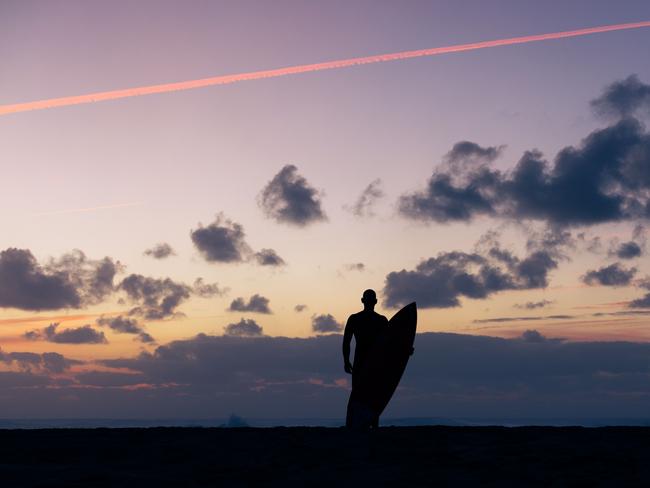
Head of corporate social responsibility and sustainability at Optus, Formston is an advocate for the disability community and accessibility – and thinks we can all do a lot better.
“Despite the fact that I’ve gotten through the world that isn’t accessible – I’ve been successful despite the world not being designed for me,” he says. “But I think we can do a lot more to help the world be better designed for everybody.
“Like I’ve currently got a really bad sprained ankle and two sprained wrists because I tripped over an access hole that the council didn’t put flush. My vet, who is a mum, had the same issue with her pram.”
Formston, who also sits on multiple boards on top of his day job, says efficiency and making the most of every minute makes it possible.
But his most important role? Dad. And Under-10 rugby league coach.
“One of the most important hats that I wear is I’m a rugby league coach for my son’s Under 10s team – and I’m 100 per cent there for their training sessions,” he says.
“If I’ve got key meetings, I’m flying home from Melbourne for that training session, and then I’ll fly back to Melbourne the next day. It’s important to me to show the kids you need to show up. It’s just being present where I need to be present.
“As a dad, I don’t answer my phone – I’m just being a dad. As a husband, I’m just being a husband. My wife would disagree with that, but I do the best I can,” he laughs.
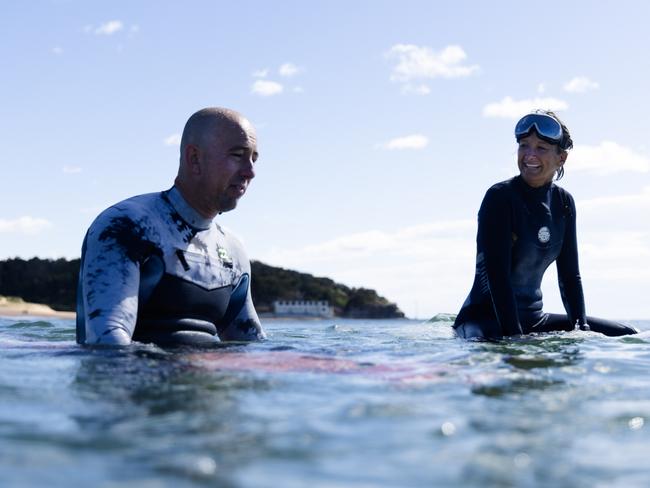
They do everything most families do – just a little differently. Like reading at night.
“The way we read at night is different to other families obviously because I can’t see that book,” he explains. “But in my head I know what words should be where and Elsie will read the letters out to me and I can tell them what the words are. So we just do things a bit differently to everyone else, but we can still do all the same things everyone else does.
“I’m just the husband to my wife, and I’m just a dad to my kids. They don’t care that I broke world records, they just want their dad to come home.
“It’s condescending when people say to me, ‘Oh, that’s amazing that you can do that, because I couldn’t do that.’
“It’s like, well, hang on … not many people in the world have surfed a 50 foot wave, why are you comparing yourself to that?
“It’s just my life. And it’s the journey.
“And I’m very privileged that I get to live the life I live – and none of it would have ever been possible without my family.” ■




